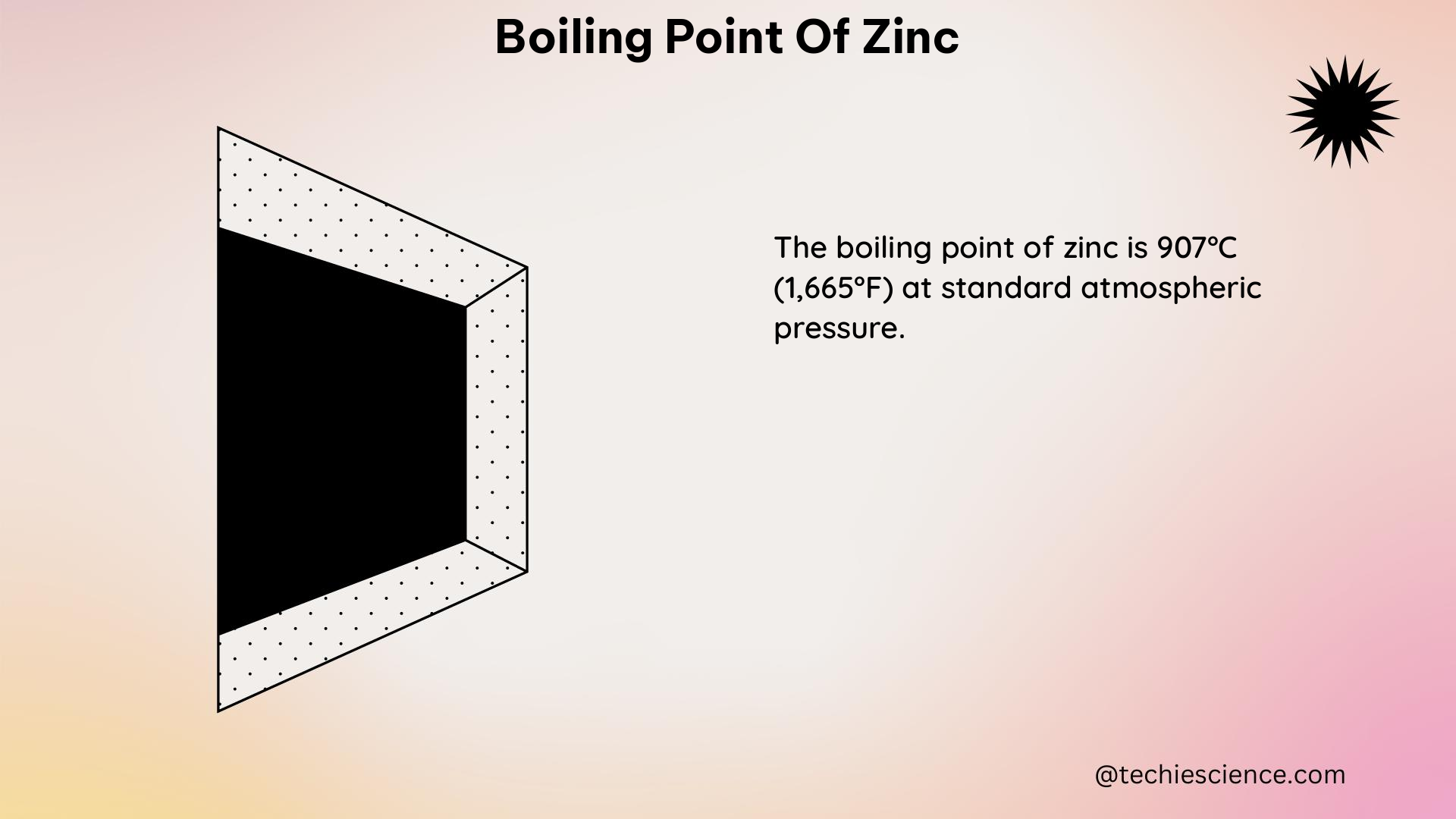The boiling point of zinc is a well-defined physical property, and it is reported to be approximately 907 degrees Celsius (°C) or 1665 degrees Fahrenheit (°F). This value is consistent across various sources and is considered a reliable measurement. Understanding the boiling point of zinc is crucial in various industrial, scientific, and engineering applications.
Understanding the Boiling Point of Zinc
The boiling point of an element is the temperature at which its vapor pressure equals the standard atmospheric pressure, typically 101.3 kilopascals (kPa). This means that at the boiling point, the vapor pressure of the liquid is equal to the pressure exerted by the surrounding atmosphere, allowing the liquid to transition into a gaseous state.
In the case of zinc, the boiling point is a critical parameter in its industrial applications, particularly in the production and processing of zinc-based alloys and compounds. When zinc is heated beyond its boiling point in an oxidizing atmosphere, ultrafine zinc oxide particles are generated, which can have adverse health effects if inhaled.
Factors Affecting the Boiling Point of Zinc

The boiling point of zinc is influenced by several factors, including:
-
Atomic Structure: The boiling point of an element is directly related to the strength of the intermolecular forces between its atoms. Zinc has a close-packed hexagonal (CPH) crystal structure, which results in relatively strong metallic bonds between its atoms. This contributes to the relatively high boiling point of zinc compared to other metals with weaker intermolecular forces.
-
Atomic Mass: The atomic mass of zinc is 65.38 g/mol, which is higher than that of some other metals, such as aluminum (26.98 g/mol). The higher atomic mass of zinc leads to stronger intermolecular forces, resulting in a higher boiling point.
-
Pressure: As mentioned earlier, the boiling point of an element is the temperature at which its vapor pressure equals the standard atmospheric pressure. Changing the pressure can affect the boiling point of zinc. For example, at higher pressures, the boiling point of zinc would increase, as the vapor pressure required to overcome the external pressure would be higher.
-
Impurities: The presence of impurities in zinc can also affect its boiling point. Impurities can alter the intermolecular forces between the zinc atoms, leading to changes in the boiling point. However, the effect of impurities on the boiling point of zinc is generally small, as zinc is typically a relatively pure element.
Calculating the Boiling Point of Zinc
The boiling point of zinc can be calculated using the Clausius-Clapeyron equation, which relates the vapor pressure of a substance to its temperature:
ln(P2/P1) = (ΔHvap/R) * (1/T1 – 1/T2)
Where:
– P1 and P2 are the vapor pressures at temperatures T1 and T2, respectively
– ΔHvap is the enthalpy of vaporization of the substance
– R is the universal gas constant (8.314 J/mol·K)
Using this equation and the known values for the enthalpy of vaporization of zinc (115.0 kJ/mol) and the standard atmospheric pressure (101.3 kPa), we can calculate the boiling point of zinc to be approximately 907°C (1,180 K).
Practical Applications of the Boiling Point of Zinc
The boiling point of zinc is crucial in various industrial and scientific applications, including:
-
Zinc Production: In the production of zinc, the metal is often extracted from zinc ore through a process called pyrometallurgy, which involves heating the ore to temperatures above the boiling point of zinc to vaporize and separate the metal.
-
Zinc Alloy Production: The boiling point of zinc is an important parameter in the production of zinc-based alloys, as it determines the temperature range at which the alloying process can be carried out without significant zinc vaporization.
-
Zinc Oxide Production: When zinc is heated beyond its boiling point in an oxidizing atmosphere, ultrafine zinc oxide particles are generated. These particles can have adverse health effects if inhaled, and understanding the boiling point of zinc is essential for managing the risks associated with their production.
-
Thermal Analysis: The boiling point of zinc is used as a reference point in thermal analysis techniques, such as differential scanning calorimetry (DSC) and thermogravimetric analysis (TGA), which are used to study the thermal behavior of materials.
-
Scientific Research: The boiling point of zinc is a fundamental physical property that helps classify elements and compounds based on their thermal behavior, which is crucial in various scientific and engineering applications.
Conclusion
The boiling point of zinc, approximately 907°C (1,665°F), is a well-defined physical property that is essential in various industrial, scientific, and engineering applications. Understanding the factors that affect the boiling point of zinc, as well as the methods for calculating and applying this property, is crucial for managing the risks associated with the production and use of zinc-based materials. By mastering the details of the boiling point of zinc, scientists, engineers, and industry professionals can optimize their processes, ensure safety, and drive innovation in a wide range of fields.
References:
- TOXICOLOGICAL PROFILE FOR ZINC. Ultrafine zinc oxide particles (0.2–1.0 µm) originate from heating zinc beyond its boiling point in an oxidizing atmosphere. https://www.atsdr.cdc.gov/toxprofiles/tp60-c3.pdf
- Chemical Forums. Why does Zinc has lower boiling points than AL? https://www.chemicalforums.com/index.php?topic=10555.0
- ScienceDirect. Zinc Isotopes – an overview https://www.sciencedirect.com/topics/earth-and-planetary-sciences/zinc-isotopes
- Clausius-Clapeyron equation. https://en.wikipedia.org/wiki/Clausius%E2%80%93Clapeyron_relation
- Enthalpy of vaporization of zinc. https://www.engineeringtoolbox.com/enthalpy-vaporization-d_485.html

The lambdageeks.com Core SME Team is a group of experienced subject matter experts from diverse scientific and technical fields including Physics, Chemistry, Technology,Electronics & Electrical Engineering, Automotive, Mechanical Engineering. Our team collaborates to create high-quality, well-researched articles on a wide range of science and technology topics for the lambdageeks.com website.
All Our Senior SME are having more than 7 Years of experience in the respective fields . They are either Working Industry Professionals or assocaited With different Universities. Refer Our Authors Page to get to know About our Core SMEs.